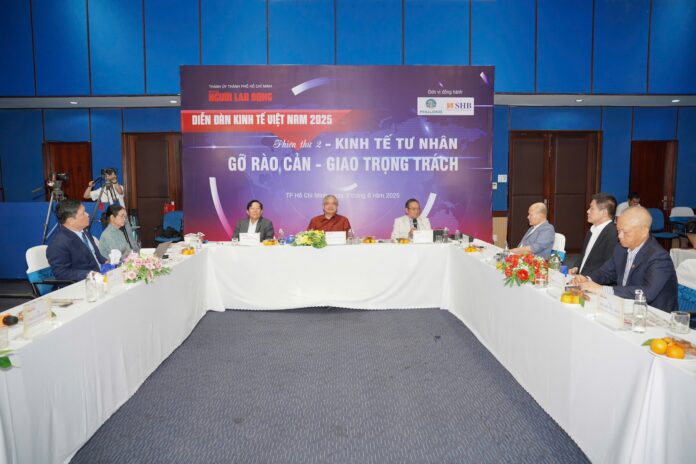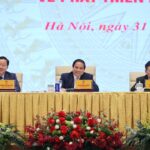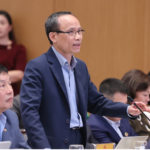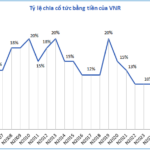At the Vietnam Economic Forum 2025’s second discussion session, themed “Private Sector: Unlocking Barriers, Embracing Responsibilities,” NLD newspaper hosted the event on June 5-6. Dr. Tran Du Lich, former Director of the Ho Chi Minh City Institute of Economics, acknowledged that Vietnam is on the cusp of a significant opportunity to accelerate its development following the issuance of the “quadruple resolutions.”
Translating Into Policies Soon
According to Dr. Tran Du Lich, Resolution 68-NQ/TW in 2025 on private sector development; Resolution 57-NQ/TW in 2024 on breakthrough development in science, technology, innovation, and national digital transformation; Resolution 59-NQ/TW in 2025 on international integration in the new context; and Resolution 66-NQ/TW in 2025 on innovating the construction and enforcement of laws to meet the country’s development demands in the new era are considered the “quadruple pillars,” addressing the nation’s developmental requirements in the new era.
To successfully implement the aforementioned resolutions of the Political Bureau, a prerequisite is to revolutionize the reorganization and reform of the state apparatus. Restructuring a streamlined, effective, and efficient apparatus is the foundation for realizing the strategic vision set forth by the “quadruple resolutions.”
“When implemented synchronously and effectively, these resolutions will contribute to building a truly developmental and constructive state. It can be said that we have never had such a significant opportunity as we do now,” Dr. Tran Du Lich remarked.
Resolution 68 underscores that the private sector is the most crucial driver of the economy. However, in reality, private enterprises still confront a labyrinth of overlapping and cumbersome business conditions, significantly hindering their freedom to operate. Thousands of business conditions remain as invisible barriers.
“Positioning the private sector in its rightful role and place in the market economy is imperative, not only at the policy level but also in the practical enforcement of laws,” emphasized Dr. Tran Du Lich.
According to businesses, the process of law-making and business environment creation has yielded some positive outcomes. Nevertheless, the current institutional system confronts substantial challenges.
Ms. Ly Kim Chi, Chairman of Tan Dong Hiep Corporation and Chairman of the Ho Chi Minh City Food and Foodstuff Association, pointed out the persistence of overlapping legal regulations and the abruptness of some policy changes, coupled with a lack of transparency in the implementation mechanism. These issues pose significant obstacles for businesses.
In the construction sector, Mr. Phan Huu Duy Quoc, Chairman of the Board of Directors of Construction Joint Stock Company No. 1 (CC1), cited that since the Political Bureau issued the Conclusion on the orientation of developing Vietnam’s railway transport, his company has been preparing and enhancing its governance, financial, and project management capabilities. However, it is unrealistic to expect domestic enterprises to instantly transform into large conglomerates capable of executing billion-dollar projects.
“To undertake large-scale projects, it is necessary to foster linkages among domestic enterprises and consider collaborations with prominent foreign corporations. With the policies outlined in Resolution 68, the state has paved a ‘highway’ for development, and private enterprises will undoubtedly grow and prosper together,” Mr. Quoc asserted.
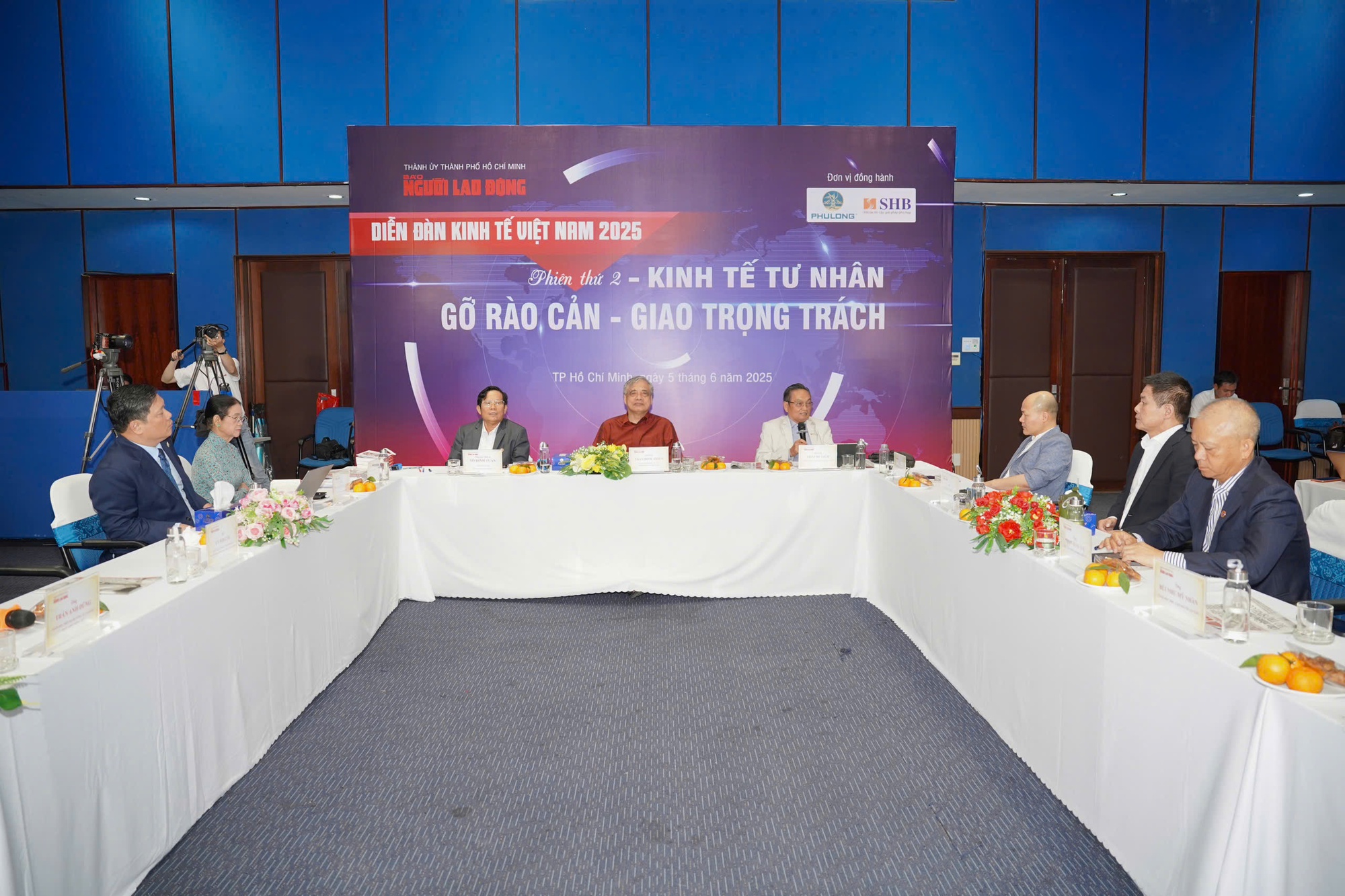
Experts and business representatives expressed their confidence that Resolution 68 and other resolutions of the Political Bureau would significantly contribute to the country’s development in the new era. Photo: DUY PHU
Assurance is Paramount
CT Group, one of the pioneering private conglomerates in embracing the spirit of Resolution 68 and Resolution 57, proposed investing in the high-speed railway project from Ho Chi Minh City to Can Tho and Ca Mau, integrating an urban model to offset operating costs. They also requested the Central and local authorities to provide special mechanisms and land funds.
In the fields of microelectronics and drones, CT Group aspires to receive comprehensive incentives in high-tech parks, including tax exemptions, capital support, and one-door procedures. The company seeks legal mechanisms for commercial flight testing, UAV export, and public-private partnerships. CT Group also suggested promoting the carbon credit and green digital currency markets, aligning with the Power Development Plan VIII, and committing to accompany the government on the journey toward green, sustainable, and technologically autonomous development.
One of the salient spirits of Resolution 68 is the non-criminalization of economic and civil relations. Attorney Truong Thi Hoa analyzed that the spirit of not criminalizing economic and civil relations applies not only to the private sector but also to the entire economy. This holds immense significance because, in the business environment, the absence of legal safety nets would deter enterprises from operating confidently, investing, or expanding their scale. Assurance is a prerequisite for sustainable business growth.
“In situations where legal boundaries straddle between administrative, civil, and criminal handling, the preference should be for non-criminal approaches. If criminal proceedings are unavoidable, the focus should be on mitigating economic consequences first. State inspection and examination practices ought to be revamped toward support and warning, enabling enterprises to make timely adjustments instead of waiting until violations occur to take action,” Attorney Truong Thi Hoa explained.
To achieve these objectives, it is imperative to invest in the training and enhancement of the moral virtues and professional competencies of the contingent of civil servants and public employees. They need to become a force that serves the people and businesses, safeguarding the freedom to conduct business and the right to own property, as enshrined in the Constitution.
“The prevailing aspiration among businesses nowadays is to circumvent the predicament of ‘smooth flow at the top but blockage at the bottom’ and to embark on a genuine revolution in administrative procedure reform,” expressed Mr. Tran Anh Dung, Executive Director of Hung Hau Development Joint Stock Company.
“Unleashing Private Enterprises: How Lower Interest Rates and Expanded Credit Access Fuel Business Takeoff”
The Governor emphasized that the banking sector eagerly anticipates the Government’s guidance on enhancing credit guarantee policies. By fostering a robust financial market, the sector aims to increase credit accessibility for small and medium-sized enterprises. This proactive approach underscores the industry’s commitment to empowering businesses and driving economic growth.
A Billionaire’s Unexpected Proposal: Premier Tran Dinh Long’s Surprising Remarks on Resolution 68 and Public Investment Projects
On May 31, Prime Minister Pham Minh Chinh hosted a dialogue with businesses and business associations in Hanoi, Vietnam, to discuss the effective implementation of Resolution 68-NQ/TW on private sector development. The event was also attended by Deputy Prime Ministers Tran Hong Ha and Ho Duc Phoc, along with leaders from various central ministries and sectors.
“Leading Vietnamese Conglomerates: Capable of Constructing the Nation’s Infrastructure”
“The following is an insightful share from the Chairman of the Board of Directors of CMC Technology Group Joint Stock Company at a seminar chaired by the Prime Minister with enterprises and business associations to effectively implement Resolution 68.”
Tax Reform: Ensuring Equity and Efficiency for Private Sector Growth
“To effectively implement Resolution 68-NQ/TW on private economic development, the Ministry of Finance is dedicated to harmonizing tax and fee policies towards fairness, efficiency, and sustainability. A comprehensive overhaul of pivotal tax laws is currently underway. Moving forward, close collaboration between government ministries and the business community will be instrumental in translating these policies into tangible outcomes.”


























